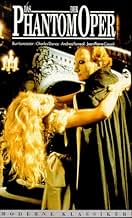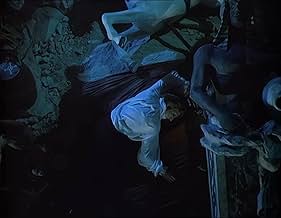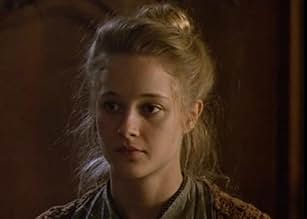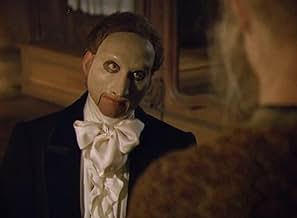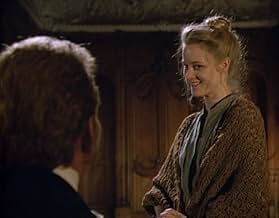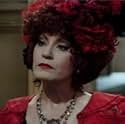Christine Daeé, uma jovem e talentosa cantora, após ser descoberta pelo conhecido playboy conde Philippe de Chagny, é enviada por seu novo patrono à Ópera de Paris para receber treinamento c... Ler tudoChristine Daeé, uma jovem e talentosa cantora, após ser descoberta pelo conhecido playboy conde Philippe de Chagny, é enviada por seu novo patrono à Ópera de Paris para receber treinamento clássico.Christine Daeé, uma jovem e talentosa cantora, após ser descoberta pelo conhecido playboy conde Philippe de Chagny, é enviada por seu novo patrono à Ópera de Paris para receber treinamento clássico.
- Ganhou 2 Primetime Emmys
- 2 vitórias e 5 indicações no total
Enredo
Você sabia?
- CuriosidadesThis film is the first production ever to be filmed within the famed Paris Opera House (in France called the Académie Nationale de Musique or Palais Garnier); the backstage area, Grand Staircase, dressing rooms, and the cellars were all shot on location at the Palais Garnier. The only scenes shot elsewhere were those at the "lagoon" (a film set), as well as in the theatre boxes and the auditorium (located in another theatre).
- Erros de gravaçãoChristine Daae's last name is mispelled on one of the posters for the production of "Faust" inside the opera house.
- Citações
Erik The Phantom of the Opera: [reaches for his ears] My God! The place really is haunted; what is that?
Gerard Carriere: Well, without looking, I would say with confidence it must be Carlotta.
Erik The Phantom of the Opera: Who?
Gerard Carriere: The new star.
Erik The Phantom of the Opera: She can't sing!
Gerard Carriere: [chuckles] Well, obviously she doesn't know that.
Erik The Phantom of the Opera: Well, someone should tell her.
Gerard Carriere: She's married to the new manager.
Erik The Phantom of the Opera: Good God. This means she's probably going to sing all the time. What kind of horror are you leaving me in?
Gerard Carriere: Erik, what are we going to do about all of this?
Erik The Phantom of the Opera: I know what to do about it. I'll kill them both.
Gerard Carriere: Oh, come on, now!
Erik The Phantom of the Opera: I'm teasing; probably the only one I need to kill is her.
Gerard Carriere: Erik!
Erik The Phantom of the Opera: What has happened to your sense of humour?
Gerard Carriere: My humour?
Erik The Phantom of the Opera: You're right. I'm sorry. I'm just not used to killing people; it threw me off a bit.
- ConexõesReferenced in Behind the Mask: The Story of 'The Phantom of the Opera' (2005)
The characters, though, weren't necessarily the most believable bunch I've ever seen, a fact that owes some to the writing, which gives them poetic but improbable dialogue, and the woe-is-me soliloquies, particularly on the part of Erik, start to wear. But of course, I can't complain too much--"Phantom" is played as either as a horror story or a melodrama, (or both), and thanks to the (overdone?) effort to make the viewer sympathise with the tragic antihero Phantom, it's not much of a horror story. The acting, too, is a little over-the-top...though a lot of that is probably intentional (and fun to watch!). I wished Christine was a stronger, less wishy-washy character (of course she really isn't shown as anything but, no matter which version, including the Lloyd-Webber "Phantom") and I wished that Phillipe was more of a presence, more of a deserving rival to the gloomy phantomized Erik. I also thought that the fact that Christine not simply sounded like, but also LOOKED like Erik's mother (prompting him to fall in love with her, the old Oedipean twist), shot down one of the main themes of the movie, voiced in Erik's complaint that Phillipe came to the opera for the wrong reason: the love of faces rather than the love of music. Much better if they would have used a different actress in the flashback scenes with Gerard (Burt Lancaster) and Belladora (?), the mother. Still, there are scenes which seem to shrug off the need for realistic dialogue or flawless acting in the beauty of their execution. Some of my favorite parts, the flashbacks, are more-or-less mimed, and to me, the movie is most effective either when the characters are singing or when scene is taking place without much dialogue. The movie is fantasy-oriented, after all, not gritty realism, and after a while you DO grow attached to the characters. All-in-all, the movie is best enjoyed in a dark room and a thick blanket, with a mentality open to fantasy and escapism and cynicism pushed off to the side.
- Nynaeve
- 11 de nov. de 1999
- Link permanente
Principais escolhas
- How many seasons does The Phantom of the Opera have?Fornecido pela Alexa
Detalhes
- Data de lançamento
- Países de origem
- Centrais de atendimento oficiais
- Idiomas
- Também conhecido como
- The Phantom of the Opera
- Locações de filme
- Paris, França(Paris Opera House/Caves of Mello)
- Empresas de produção
- Consulte mais créditos da empresa na IMDbPro
- Tempo de duração1 hora 24 minutos
- Cor
- Proporção
- 1.33 : 1
Contribua para esta página


